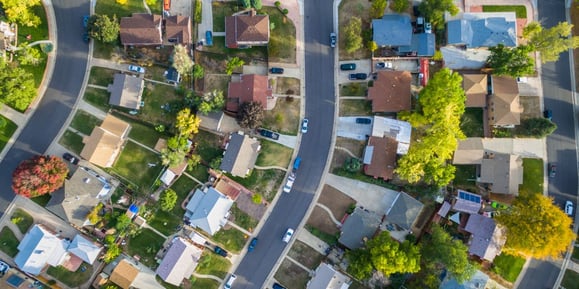 Are you a homeowner looking to sell your property? Or are you in the market for a new home? While sellers and buyers may approach the market differently, they share an interest in the elements influencing a property's value. A mix of factors determines how much a home is worth. Some objective factors, like the location and market conditions, play a big role and are pretty reasonable. Nevertheless, subjective value judgments also matter.
Are you a homeowner looking to sell your property? Or are you in the market for a new home? While sellers and buyers may approach the market differently, they share an interest in the elements influencing a property's value. A mix of factors determines how much a home is worth. Some objective factors, like the location and market conditions, play a big role and are pretty reasonable. Nevertheless, subjective value judgments also matter.
In this post, we'll explore the top eight factors that affect property value. Understanding these key drivers can help you, whether as a buyer or a seller, get the best price and provide insights into how to increase home value over time.
1) Location: The #1 Factor to Affect A Home Value
Location is the number one factor influencing a home’s worth. Although location could be a matter of preference, for instance, proximity to family or a preferred climate, there are some concrete location-related aspects that impact property value:
- Quality of nearby schools
- Access to jobs and employment centers
- Neighborhood safety and security
- Accessibility to main roads, transit, and highways
- Proximity to amenities like shops, restaurants, parks, trails, entertainment, grocery stores (especially popular chains like Starbucks, Trader Joe's and Whole Foods)
As you can expect, desirable locations create buyer competition, which pushes values up. Properties near amenities and jobs in vibrant areas command premium prices. Conversely, locations far from a city center or near infrastructure like highways or train tracks tend to have lower values.

2) Neighborhood Comps
Neighborhood comparable sales, or "comps," refer to the prices at which similar properties within a neighborhood have recently been sold. This concept is quite simple: when comparable properties in the area are sold at higher prices, they raise the values of surrounding homes.
While not an exact science, neighborhood comps provide a baseline for setting an attractive listing price. If buyers pay more for comparable houses nearby, you can expect an elevated value for the home you’re selling/buying. To accurately leverage comparable sales for a value estimate, it's crucial to seek out the most recently sold homes that closely resemble your home’s features. This includes factors such as the number of stories, square footage, bedroom count, and characteristics like homes in subdivisions or those in cul-de-sacs, among others.
3) Home Size: Yes, Size Does Matter Here!
A home's square footage and bedroom/bathroom count are key factors influencing its market value. Larger homes with more living space and bedrooms typically have a higher value
Generally, the property's market value is established based on its price per square foot. This figure is calculated by dividing the property's price by its total square footage. For instance, if a 1,500-square-foot home sells for $525,000, the price per square foot would be $350. It's important to remember that this calculation usually excludes areas like garages, unfinished basements, and attics.
FYI - According to an NAHB analysis, in early 2022, the average house size in the U.S. was around 2,310 square feet.
4) The Local Market: Supply and Demand
The basic economic forces of supply and demand significantly influence home values. When demand is high - inventory is low, prices are high, and vice versa.
For example, North Carolina has seen huge popularity as a destination for domestic relocations. This influx of eager buyers has heightened competition for properties in the region, leading to a shrinking housing inventory and a subsequent price rise. According to Forbes, as of June 2023, listings in popular NC cities were down over 35% YoY, while median sales prices increased 4.4%. Moreover, as of April 2023, homes priced from $125,000 to $249,000 spent an average of only two months on the market due to high demand.
Practically speaking, in a seller’s market, many buyers compete for fewer homes; thus, the homes move quickly for a higher price. However, in a buyer's market with plentiful listings, homes are slower to sell, and extended days on the market can negatively impact perceived value. This provides buyers more leverage to negotiate the best deal.

5) The Home Age & Renovation Upgrades
A home's condition directly impacts its market value. Newer properties usually command a higher home value because buyers don't have to worry as much about repairs and maintenance on critical systems like the roof, plumbing, and electrical. Similarly, homes that are better maintained and come with warrantied features are more valuable to buyers who want to avoid future upkeep costs.
Investing in updates and upgrades can definitely enhance your property value, particularly in older properties with outdated features, and that applies to interior and exterior features. However, not all home improvement projects yield the same results. For instance, kitchen remodeling and energy-efficient appliance installation are among the best home upgrades that are totally worth it.
6) Economic Indicators & Interest Rates
Broader economic conditions beyond your local market can also impact a home value. As a general rule of thumb, during economic downturns with higher unemployment or declining wages, fewer buyers can afford home purchases, decreasing demand and therefore decreasing prices.
Another key economic indicator to watch is interest rates, and if you were never interested in interest rates, now is the time to do so. The immediate consequence of increased interest on loans is higher mortgages, but this does not always mean higher property values. In fact, when interest rates are low homes will often increase in price due to increased demand. Pro tip: never skip your Economics class.

7) The View
Does your house overlook the mountains? Is it facing a highway? Perhaps the view is obscured by neighboring tall buildings? All these factors can impact a home’s value, though less significantly than location or home specs.
Generally, the better the view, the higher the property value. Homes with a sublime view of the mountains, the lake, or the ocean are much more in demand than homes with a view of the neighbor’s garage or parking lot. Even nice views of neighborhood parks or local landmarks can increase worth. It's important for buyers to research future development plans for empty lots or adjacent land. A perfect ocean view could be blocked by a hotel and decrease the value of your property once you have bought it!
Enjoy More >> Living in the Blue Ridge Mountains? Maximize your mountain views
8) Perceived Value
Lastly, it's important to bear in mind that property values can sometimes be influenced by subjective and—frankly—irrational factors. For example, a death on the property is not valued highly, especially if the property is the site of a murder, suicide, or documented haunting. Some states require these facts be disclosed but others don’t. It’s probably best to keep the skeletons in the closet in order to keep the property value up!
Increase Your Home Value
Whether you currently want to sell your house or you're entering the market as a buyer, understanding what shapes property value is key. Location sets the foundation, then factors like market conditions, home features, upgrades, and perception will come into play.
Living in any of our Vista communities guarantees not only a stunning view and impeccably maintained properties but, above all, it provides you with the ideal place to call home. We'd love to help you in your move to Western North Carolina. Call us at (866) 519-2400 or contact us online today.


